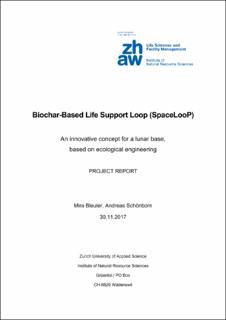Bitte benutzen Sie diese Kennung, um auf die Ressource zu verweisen:
https://doi.org/10.21256/zhaw-3480| Publikationstyp: | Working Paper – Gutachten – Studie |
| Titel: | Biochar-based life support loop (SpaceLooP) |
| Autor/-in: | Schönborn, Andreas Bleuler, Mira |
| DOI: | 10.21256/zhaw-3480 |
| Umfang: | 57 |
| Erscheinungsdatum: | Nov-2017 |
| Verlag / Hrsg. Institution: | ZHAW Zürcher Hochschule für Angewandte Wissenschaften |
| Verlag / Hrsg. Institution: | Wädenswil |
| Sprache: | Englisch |
| Schlagwörter: | Space Life Support System; Biochar; Feces Urine recycling |
| Fachgebiet (DDC): | 620: Ingenieurwesen 630: Landwirtschaft |
| Zusammenfassung: | In the present study a new concept for ecological life support systems based on complete oxygen, water and food recycling for a future moon base was developed. Starting from the hypothesis that the pyrolysis of human feces to biochar would be a suitable waste treatment measure, a conceptual design for a life support system including hydroponic food production and O2-generation, water recycling and CO2-balancing with biochar incineration was proposed. In the system, the biochar can be used as plant substrate or fertilizer in the hydroponic, or can be incinerated to provide CO2 for plant production. Based on literature review and modelling of mass flows in the system, using a mass balancing approach, several benefits of the inclusion of pyrolysis into a life support system were identified. Pyrolysis ensures complete destruction of pathogens, fibers and organic micropollutants contained in feces that could be harmful for hydroponic food production and human health. Pyrolysis further is a treatment process that does not require oxygen (like incineration). The treatment of wastes can therefore be achieved even without consuming the oxygen required by the crew. Moreover, carbon, and nutrients can be stored in a sterile and stable char and reused when there is need. Difficulties in nutrient recycling from biochar and pH balances in the system were identified as threats to the system. Further research needs to confirm the feasibility of fecal biochar as a hydroponic substrate of fertilizer and its impact on pH balances. |
| URI: | https://digitalcollection.zhaw.ch/handle/11475/1971 |
| Lizenz (gemäss Verlagsvertrag): | Keine Angabe |
| Departement: | Life Sciences und Facility Management |
| Organisationseinheit: | Institut für Umwelt und Natürliche Ressourcen (IUNR) |
| Enthalten in den Sammlungen: | Publikationen Life Sciences und Facility Management |
Dateien zu dieser Ressource:
| Datei | Beschreibung | Größe | Format | |
|---|---|---|---|---|
| SpaceLooP2017_finalReport.pdf | SpaceLooP_Final_Report | 2.91 MB | Adobe PDF |  Öffnen/Anzeigen |
Zur Langanzeige
Schönborn, A., & Bleuler, M. (2017). Biochar-based life support loop (SpaceLooP). ZHAW Zürcher Hochschule für Angewandte Wissenschaften. https://doi.org/10.21256/zhaw-3480
Schönborn, A. and Bleuler, M. (2017) Biochar-based life support loop (SpaceLooP). Wädenswil: ZHAW Zürcher Hochschule für Angewandte Wissenschaften. Available at: https://doi.org/10.21256/zhaw-3480.
A. Schönborn and M. Bleuler, “Biochar-based life support loop (SpaceLooP),” ZHAW Zürcher Hochschule für Angewandte Wissenschaften, Wädenswil, Nov. 2017. doi: 10.21256/zhaw-3480.
SCHÖNBORN, Andreas und Mira BLEULER, 2017. Biochar-based life support loop (SpaceLooP). Wädenswil: ZHAW Zürcher Hochschule für Angewandte Wissenschaften
Schönborn, Andreas, and Mira Bleuler. 2017. “Biochar-Based Life Support Loop (SpaceLooP).” Wädenswil: ZHAW Zürcher Hochschule für Angewandte Wissenschaften. https://doi.org/10.21256/zhaw-3480.
Schönborn, Andreas, and Mira Bleuler. Biochar-Based Life Support Loop (SpaceLooP). ZHAW Zürcher Hochschule für Angewandte Wissenschaften, Nov. 2017, https://doi.org/10.21256/zhaw-3480.
Alle Ressourcen in diesem Repository sind urheberrechtlich geschützt, soweit nicht anderweitig angezeigt.